Oxford: The City of Dreaming Spires
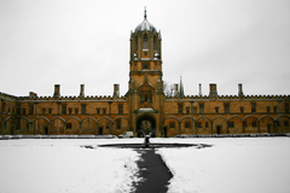
For almost 800 years, scholars have gathered in its colleges and halls, creating a lively intellectual community. Join with them during summer 2014 as a participant in "Representations of the 'Other': Jews in Medieval England". This NEH summer institute for college and university faculty or current full-time graduate students in the humanities will meet for five weeks (13 July-16 August 2014) to explore evolving constructions of Jewish alterity in medieval Christian society. Whereas in the early Middle Ages 'otherness' had largely been defined in terms of language, custom, law, or religion, by the fourteenth century new constructions of 'otherness' are invoked that cause the status of Jewish (and Muslim) communities in Europe to deteriorate, leading to the eventual expulsion from most lands in Christendom of those who refused baptism. A team of distinguished scholars will examine this phenomenon, and, treating the experience of Jews as paradigmatic, 'otherness' will be examined especially through the disciplines of history, philosophy, canon law, and art history.

What to Expect
After a brief introduction to the patristic and early medieval toleration of Jews in the West, the program will focus upon the increasingly frequent demonization of Jews in twelfth and thirteenth-century literary polemics and public disputations, confirmed by images drawn from medieval art and literature. The program will close by narrowing our focus to highlight the experience of Jewish communities in medieval England.
Jeremy Cohen (Tel Aviv University), Sheila Delany (Emerita, Simon Fraser University), Daniel J. Lasker (Ben-Gurion University of the Negev), Sara Lipton (SUNY-Stony Brook), and Robert Stacey (University of Washington) comprise the core faculty leading this investigation. Each has written extensively on medieval Jewish-Christian relations and reflected upon constructions of Jewish identity. As a medievalist who has written on Christian views of Jews, with a special interest in evidence drawn from medieval science and medicine, I shall also contribute to the program and attempt to bridge the discrete presentations. In addition, as institute director I will be responsible for program administration.
The program of study is an exciting one. We plan to provide all readings in English and will not require facility in Latin, Hebrew, or medieval vernaculars. The five-week program will meet for lectures, discussions, and seminars on Mondays, Tuesdays, Thursdays, and Fridays. Reading assignments will, typically, not exceed 100 pages per day. Wednesdays are reserved for optional trips, individual discussion with core faculty, or private research and reading. On typical Monday and Friday mornings, meetings will be scheduled from 9:30-10:15, followed by a short break, with discussion continuing from 10:30 to noon. Tuesday and Thursday meetings will be held from 9:30 to 11:30 and 1:00 to 3:00. Coffee and tea will be provided daily in the senior common room. At the program's conclusion, the institute's twenty-five participants will be asked to prepare model syllabi incorporating the materials from our investigation into undergraduate courses. These syllabi will be distributed subsequently to all participants. With the permission of the participants, sample syllabi may also be made available to a wider academic audience via the Internet.
The program will be conducted in England at the Oxford Centre for Hebrew and Jewish Studies (OCHJS). Located on its own campus in Yarnton, six miles from the center of Oxford, OCHJS is a recognized independent centre of the University of Oxford, offering a masters degree in Jewish Studies. Its campus offers a modern library with more than 110,000 volumes, common rooms, and housing. Institute participants will have the status of visiting faculty members, enabling them to obtain privileges at Oxford's Bodleian library and related university libraries. Public transportation to Oxford and nearby towns (e.g. Woodstock) is readily available.
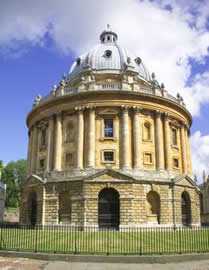
Radcliffe
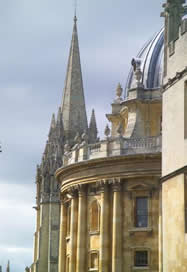
Radcliffe
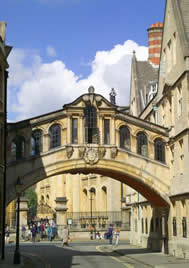
Hertford Bridge
Lodging
Since the academic year at OCHJS will have ended, all of Ricardo House, the graduate student residence at OCHJS, has been reserved for participants. It contains sixteen large private rooms arranged in four suites. Each suite consists of four comfortable private bedrooms around a shared kitchen and bath. These fully furnished rooms are available to participants for £1225 for the entire five-week period. No meals are included, nor is there food service at OCHJS. However, groceries and necessities can be obtained a few blocks away. In addition to Ricardo House facilities, other single rooms will be available at OCHJS to accommodate all 25 participants. Participants who would like to bring a spouse or significant other may share a room at OCHJS, although at some additional charge. Although there are a few handicap-accessible rooms in Ricardo House, in general seminar rooms and library facilities at OCHJS—not to mention facilities in Oxford—are not. Please contact me directly with inquiries concerning special needs.
We may also have some larger facilities—furnished flats or cottages—available to us at OCHJS (price to be determined) suitable for small families. Laundry facilities are available on site. For participants with families that can not be accommodated on the OCHJS campus, we will compile a list of furnished flats or houses available to rent in Yarnton, Oxford, or other nearby communities.
Typically, we have enjoyed wine and cheese one afternoon each week in the lovely gardens at OCHJS, for a modest charge. We also plan a walking tour of medieval Jewish Oxford. Although there are no athletic facilities at OCHJS, there are walking paths and bicycle paths. Bicycles can be rented from a number of area vendors.
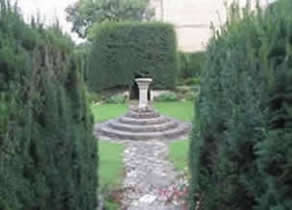
Yarton Enclosed Garden
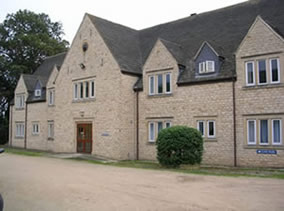
Ricardo House
I would encourage institute participants to bring laptop computers. Very recently, the OCHJS campus installed a campus-wide wireless network! Participants with a laptop will easily be able to access the internet and web-based e-mail from anywhere on campus. Those who do not bring a laptop will have access to PCs in the OCHJS library, which have internet connections and a printer. Finally, we expect to make one or two computers available for general use in the Ricardo House common room. These will have internet access, and be linked to at least one printer.
Stipend
The twenty-five college and university faculty members or qualified graduate students selected to participate in the program each will receive a $3900 stipend to help defray expenses. Since NEH stipends for programs overseas are the same as those for domestic programs, we encourage successful applicants to apply early to their home institutions for additional assistance with travel expenses. For an Oxford-based program this is especially important, since the cost of living is quite high and the exchange rate is unpredictable.
Applications consist of:
- an application cover sheet
- a brief curriculum vitae
- essay
Perhaps the most important part of the application is the essay. This should include relevant personal and academic information; reasons for applying; a discussion of your qualifications and interest in the topic; and, a discussion of what you hope to gain by participation, in relation both to your research and teaching. Completed application materials may be submitted to the project director electronically in e-mail attachments; if submitted in hard copy, application materials must be postmarked no later than March 4, 2014. Applicants will be notified of the outcome by March 31, 2014, and successful applicants will have until April 5 to accept or decline the offer.
Please send completed applications to:
Professor Irven M. Resnick - [email protected]
Director, "Representations of the 'Other': Jews in Medieval Christendom"
Department of Philosophy and Religion, Dept. 2753
University of Tennessee at Chattanooga
615 McCallie Ave.
Chattanooga, TN 37403-2598